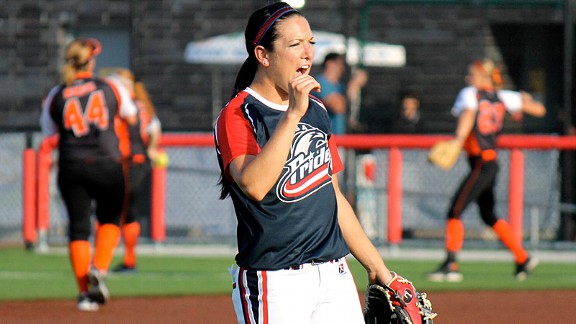
 Pitch after pitch, inning after inning, Monica Abbott and Cat Osterman did what arguably the two best pitchers on the planet are supposed to do. That the setting for their meeting was a regular-season game with limited long-term implications felt more and more incidental with each inning. Even the shirt-wringing heat and humidity of a Chicago summer hitting its stride seemed slightly more sufferable, or at least temporarily less noticeable.
Pitch after pitch, inning after inning, Monica Abbott and Cat Osterman did what arguably the two best pitchers on the planet are supposed to do. That the setting for their meeting was a regular-season game with limited long-term implications felt more and more incidental with each inning. Even the shirt-wringing heat and humidity of a Chicago summer hitting its stride seemed slightly more sufferable, or at least temporarily less noticeable.
For a little less than two hours on a June night — all it took to play seven innings — Abbott and Osterman needed neither the drama of a postseason stage nor ideal conditions. Two athletes in their primes pushing each other was enough to make it the kind of encounter that stands apart, like Federer versus Nadal or LeBron versus Durant. Years removed from their college glory, the two most prolific strikeout pitchers in NCAA history struck out 19 batters between them. The 49 batters who came to the plate managed just four hits and one run. A hit batter, stolen base and double were enough to beat Osterman’s USSSA Pride and give Abbott’s Chicago Bandits a 1-0 win.
Neither pitched the best game of her life, but their sport doesn’t get much better than it was in their hands that night.
“It is fun; it never get olds,” Bandits associate coach Michael Steuerwald said of the duel. “It’s fun as a coach, especially knowing you’ve got to work hard to push across one or two runs and hopefully that’s enough to win a game for you. It never gets old for me. And I know the limelight probably isn’t there with it for them because they’ve been through it so many times, but it’s still enjoyable from a coaching perspective to see it.”
It was possible to see it because of a women’s professional sports league that quietly survives, though it still struggles to thrive, almost a decade after it first took the field.
National Pro Fastpitch will complete its ninth season this weekend when the four-team professional softball league crowns a champion in Rosemont, Ill., part of the Chicago metropolitan area and home of the defending-champion Bandits. The NPF’s roots actually date to the Women’s Professional Softball League (WPSL), which existed in various forms from 1997 through 2000, at which time it ceased play before it was relaunched as the NPF in 2004. But even the nine-year history of the league in its current form gives the NPF a longer continuous run than the combined tenures of WUSA and WPS, the women’s soccer leagues that failed to successfully turn interest in the United States women’s national team and its World Cup and Olympic exploits into a sustainable domestic professional league.
Softball does not have such international stages; the sport is no longer part of the Olympics and its world championship passed almost without notice earlier this summer. The NPF doesn’t have the same television exposure that the WUSA and WPS had with their regular national cable broadcasts. Nor does the league have a partnership as financially favorable as of that of the WNBA and NBA. The NPF is classified as an official development partner of Major League Baseball and hopes to strengthen those ties, but the latter’s financial investment is minimal at the moment. Yet the league keeps going summer after summer.
Those involved will tell you it can succeed financially, capturing the market that pushed Women’s College World Series ratings and attendance to records in recent years, but there is also faith less fiscal in origin at work.
Buying in
Akron Racers co-owner Joey Arrietta has been involved with the two pro softball leagues as long as anyone. The Racers are the lone franchise to survive in one location for all nine seasons of the NPF. They were also a member of the WPSL.
“I’ve seen a lot of people come and go, I’ve seen a lot of teams come and go,” Arrietta said during one of her team’s games. “I want this to succeed more than I can even explain to you, but I want it to succeed in a way that is complimentary and dignified for these [young fans] that are running around here because I think we have a responsibility to those kids. And I take that responsibility very seriously.”
Both the sincere vision and hardscrabble reality of the NPF are evident in the league’s (sort of) newest franchise. Originally based in Texas when the league relaunched in 2004, the Texas Thunder relocated to Rockford, Ill., before the 2007 season and won a championship there before taking on a new name and a new home as the Tennessee Diamonds in 2010. Without an ownership group in place last season, the Diamonds were operated by the league and existed as a barnstorming team, playing what would have been their home series everywhere from Round Rock, Texas, to Calgary, Alberta. A young team, they finished 6-32.
It was late in that campaign that Amelia Nemeth and her husband, Alan Demaske, saw the road-weary Diamonds play in Akron, where the couple had traveled from their North Carolina home. Nemeth played some softball growing up, but neither she nor her husband seemed to be likely sports moguls — she is a certified public accountant and they run a general contracting company near Charlotte. One of their daughters begged them to go to a game in Akron, and they returned the following night, struck by how the players from both teams interacted with fans during a rain delay and after the games. That seed was enough for them to research more about the league when they returned home and begin talking about getting involved. Within a matter of months, they were the owners of the Carolina Diamonds.
In a sentiment echoed across the league, they view the franchise as an investment with potential but also something more.
“Definitely we hope someday to be profitable,” Nemeth said. “But to me, when you see them as such good role models, right now, they’re very quality players, they’re quality people and when you see them interacting with the young ladies and the community around them … yes, there is a business motive to it, but on the other hand, it’s giving back to the community, becoming part of the community and making good role models.”
That, of course, is not always enough to make the financial numbers work, as evidenced by the number of teams the NPF has lost, including franchises in Arizona, Connecticut, Massachusetts, New York and Philadelphia, in addition to the wanderings of the Thunder-turned-Diamonds. The three other existing teams have varying degrees of full-time staff, but the Diamonds are truly a mom-and-pop business outside of the players and coaches, relying on volunteers and a few seasonal hires to run things as the team plays games at minor league baseball stadiums around the state (both the Diamonds and Pride generally play home games on baseball fields modified for softball dimensions, while the Bandits and Racers play on normal softball fields). The first year has been a difficult learning experience for the new owners, from finding out which stadiums and minor league teams would work with them to figuring how to best utilize social medial to promote games in a league with minimal television and media exposure.
Nemeth offers a wan chuckle when asked what she would have told someone with a similar business plan who came to her for advice in her capacity as a CPA. She jokes she probably shouldn’t answer; her banker might read it.
“You always know you’re not going to have enough time and not going to have enough money,” Nemeth said of a new small business. “It has been a bigger mountain than we first expected; it has been a challenge.”
Humble roots
Payrolls in the league are capped at $150,000 for rosters of 20 players. A handful of stars make in the neighborhood of $15,000 to $20,000 for the 44-game season, but most players are paid less than $10,000. Housing is provided and the base salaries can be augmented by personal-service contracts for work beyond the season, one way a team like the Pride, with the relatively deep pockets of Don DeDonatis’ United States Specialty Sports Association behind it, is able to assemble a roster that includes seven former American Olympians and two former Canadian Olympians, in addition to numerous former college All-Americans.
Players who make it to veteran status usually have a story something like that of Jami Lobpries, an outfielder for the Diamonds in her fourth season in the league. Lobpries wasn’t an All-American at Texas A&M, but she was an all-conference player who was the emotional backbone of a team that advanced to the championship round in the Women’s College World Series. She spent her first few years out of school coaching, first as a graduate assistant at Texas A&M and then at Monmouth University in New Jersey, but used the most recent offseason to complete her first year of work toward a Ph.D. in sports marketing. Despite that workload and having been worn out by the traveling road show that was the Diamonds last season, she had surgery to repair a torn ACL and put in the rehab to make it back for one final season.
After a recent loss to the Pride in Kannapolis, N.C., that left them on the wrong end of a four-game sweep, Lobpries and veteran teammates such as Angeline Quiocho and Bianca Mejia were out on the field, signing autographs and steering children around the bases as part of a postgame promotion.
“It’s not just about playing,” Lobpries said. “It’s about growing this league, whether that is going out for appearances, doing camps and clinics, calling into radio stations and doing interviews. We made it clear to [the new Diamonds ownership] that it’s not just our job to play, it’s our job to grow this and promote this. We’re their employees and we’re willing to help out any way we can.”
There is nothing luxurious about the lifestyle, whether it’s flying into town the morning a series begins or riding buses for double-digit hours to save on airfare. A former Canadian Olympian and two-time national player of the year for the University of Washington, Danielle Lawrie is in her third season with the USSSA Pride and ranks fourth in the league in ERA and third in strikeouts per seven innings, behind only Abbott and Osterman. She is one of the best players in the world in her sport, perhaps even better relative to her peers than her younger brother, Toronto Blue Jays standout Brett Lawrie. That her professional experience more closely resembles that of her boyfriend, Drew Locke, an aspiring major leaguer playing in the Houston Astros’ organization, speaks volumes about the slow progress of women’s professional team sports.
“It’s a difficult thing as a female, but the more you try to dwell on it, it’s only going to dig you in a deeper hole,” Lawrie said. “I can honestly say I’ve never felt an ounce of jealousy toward my brother. Because it’s just reality; it’s not for us. This is our reality and I’m lucky enough I [also] got the opportunity to play in Japan and do that and experience that and I’m so grateful for it and that’s taught me a lot about the game. Any way you can take playing and make you better as a person, as a family member, everything, and playing over there and in this league has really helped me.
“We know we’re not going to make a million dollars in a year. It’s just not going to happen.”
Best of the best
The quality of the product nonetheless continues to improve. It’s in part because the league shrank from a high of seven teams to its current four teams, condensing the talent pool. But it’s also because players like Abbott, Osterman, Jessica Mendoza and others who formerly balanced interest in pro softball against summer commitments to national teams focused their full-time attention on the NPF when softball was eliminated from the Olympics.
The economic reality of the league means many college stars never participate, choosing instead to begin careers beyond the playing field, but there is no place in the world where more softball talent comes together on one field than in a typical NPF game.
“Not just one through nine, but you look one through 20 in every lineup and it’s insanity,” said former Olympian and Arizona All-American Caitlin Lowe, now an outfielder for the Pride. “In a Pac-10 game you’d have Natasha Watley at shortstop, but you’d also have Jenn Salling at shortstop, you’d also have Lauren Lappin at shortstop [all three compete for time at the position for the Pride]. The depth of these lineups is incredible. You’re not pinch-hitting Joe Schmo, you’re pinch-hitting someone that would hit .400 in the Pac-10. Not just pitching-wise, but offensively, nobody is an easy out in this league and nobody is an off day as a hitter in this league. You have to be on your A-game every day.”
For all their star power, the Pride learned that lesson when they were upset in last year’s championship series by the Bandits. Now hosting the postseason in the league’s showcase facility, a softball-only stadium built by the village of Rosemont to eventually be part of a dual softball-baseball complex, Bandits owner Bill Sokolis said he is as optimistic about the league’s future as he has been in years. There is serious talk of at least one expansion team joining the league in 2013, and his Bandits drew more than 19,000 fans this season, second to the Pride. Their average of 896 fans per game isn’t out of line with some low-level minor league baseball teams. In the same geographic region, the Beloit Snappers and Burlington Bees of the Class A Midwest League were averaging 985 and 861, respectively, as of Aug. 21.
Sokolis jumped at getting involved with the Bandits in 2005 for the same reason that comes up with all of the league’s owners: the opportunity to give girls like his daughters the same kind of role models he had growing up watching players like Billy Williams with the Cubs. But for all of that, a professional league is, at some point, a business with a bottom line. And thus far, the NPF has proved only that it can survive, tenuously at times.
“It’s become more of a business to me because I have to find a way to make the model work,” Sokolis said. “So Chicago, in itself, is trying to build a business so that it’s a franchise that can possibly make money. The way we can come up with participation of sponsorship, television, all those avenues we still have to cross.”
It’s not yet clear that there is room in the marketplace for a thriving professional softball league. Nine years in, it’s also not yet clear that there isn’t. And that’s a start.
The USSSA Florida Pride is a professional franchise in the National Pro Fastpitch League that is owned and operated by USSSA. The amateur organization of USSSA has multi-sport coverage and encompasses teams and players from the United States and abroad.
About NPF:
National Pro Fastpitch is headquartered in Nashville, TN. The league, created to give elite female fastpitch players the opportunity to pursue a professional career in their chosen sport, has operated since 1997 under the names of Women’s Pro Fastpitch (WPF) and Women’s Pro Softball League (WPSL). NPF is the Official Development Partner of Major League Baseball in the category of women’s fastpitch softball since 2002.
About USSSA:
The United States Specialty Sports Association (USSSA), headquartered in Osceola County, Florida, USSSA is the World’s Largest Multi-sport Athletic Organization. Founded in 1968, USSSA has grown to over 3.7 million participants, competing in 13 nationally sanctioned sports including Baseball, Fastpitch, Slow Pitch, Karate, Basketball, Soccer and more! For more information on USSSA and to register your team visit USSSA.com. Also be sure to visit USSSAToday.com for the latest USSSA News!


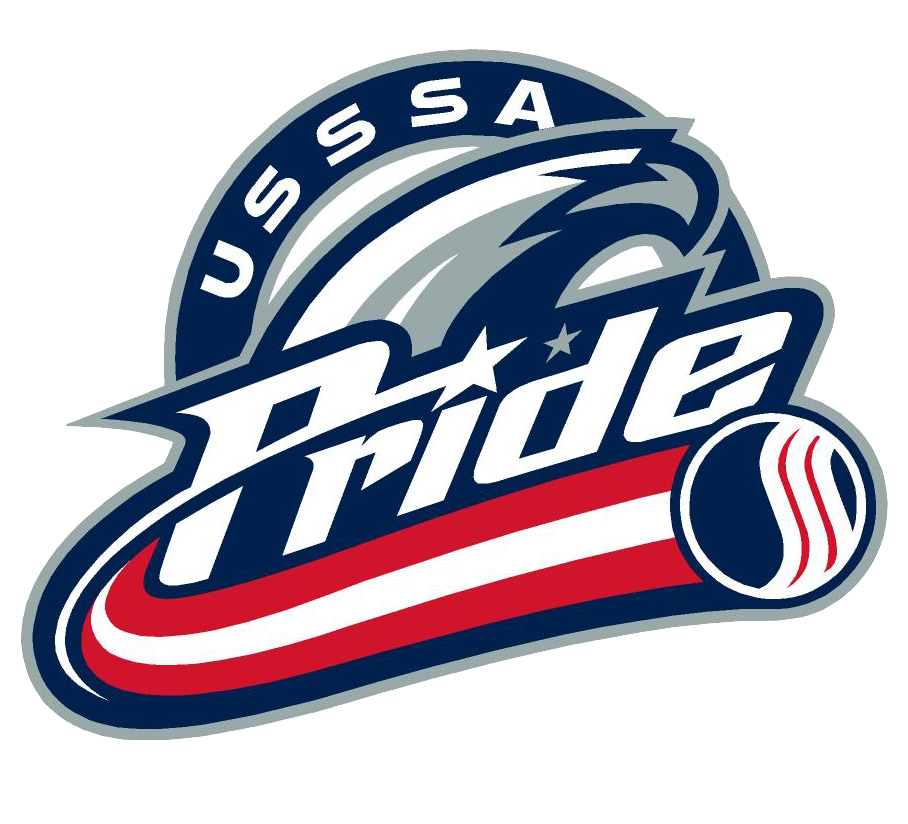
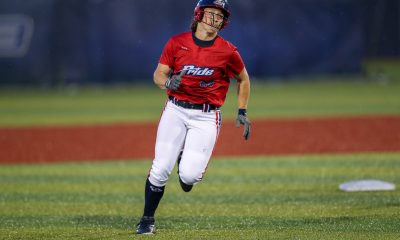

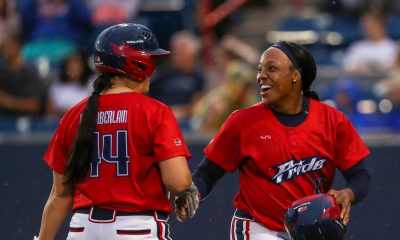

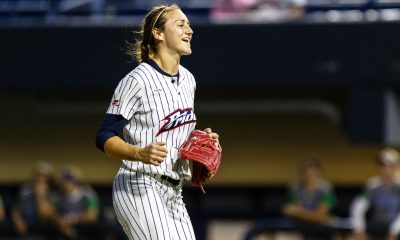





You must be logged in to post a comment Login